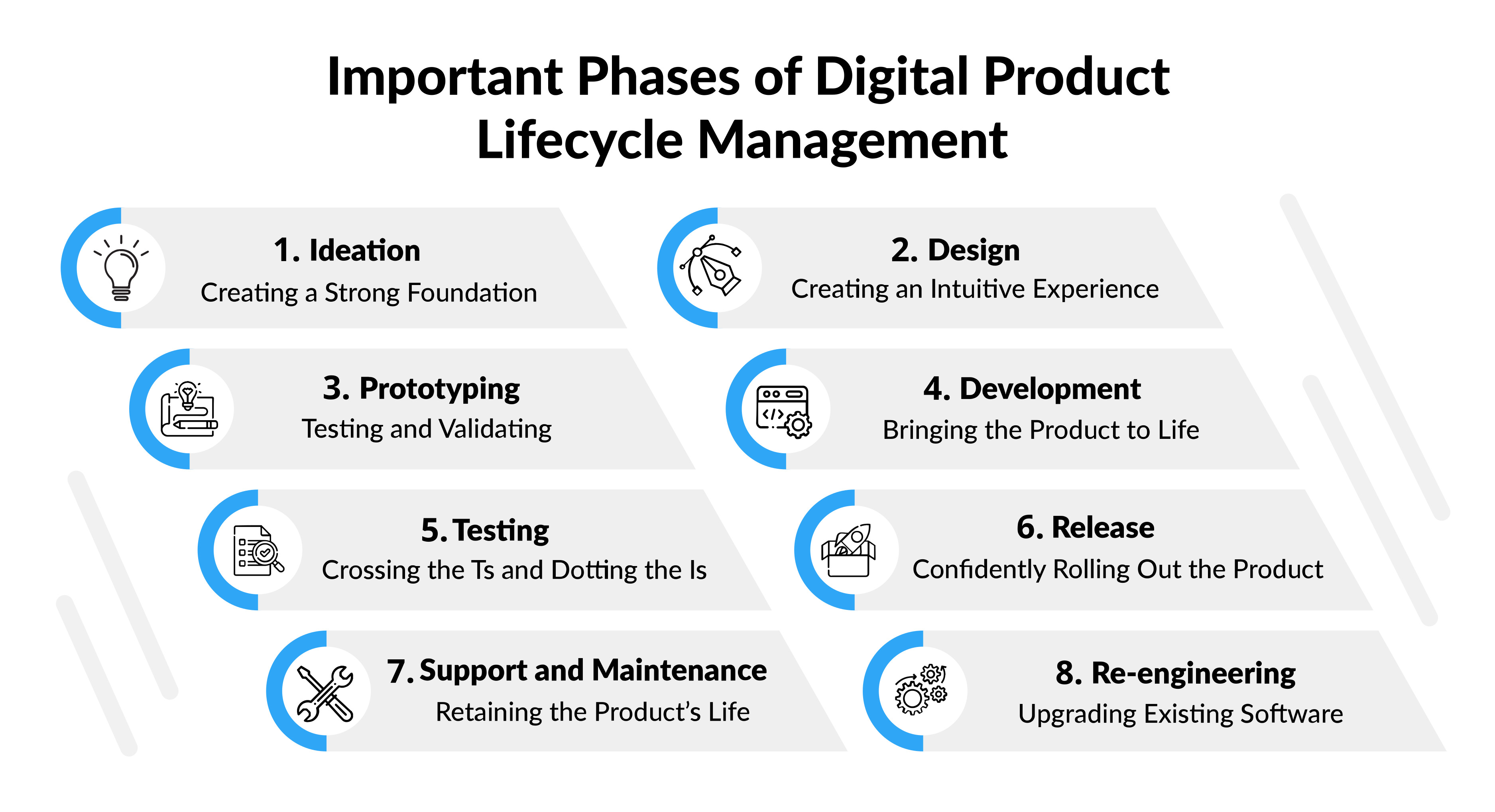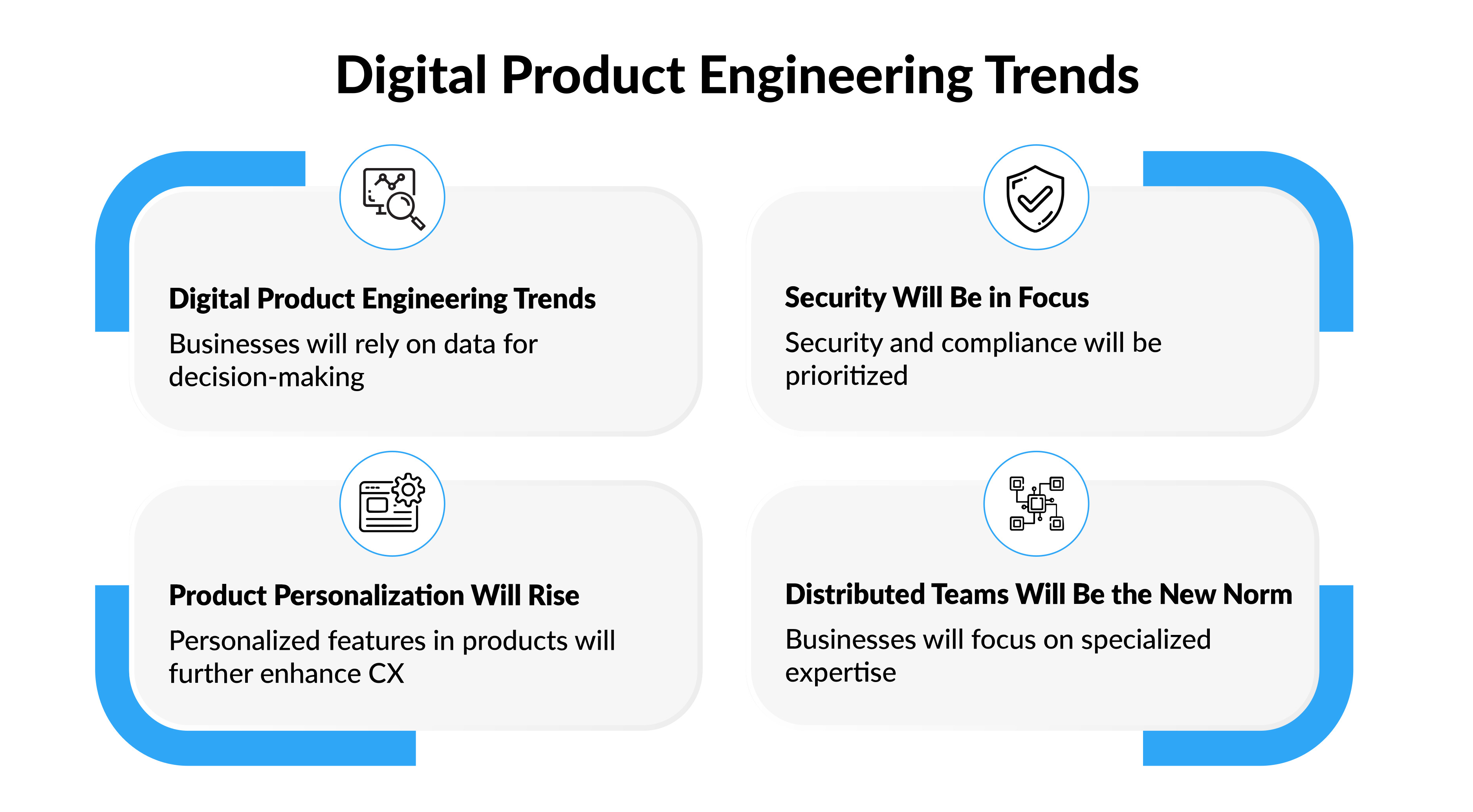



In today's rapidly evolving digital landscape, enterprises must stay ahead of the curve to thrive. That's where digital product engineering steps in—a game-changing approach that empowers businesses and fuels success using emerging technologies and innovative solutions.
With digital engineering services, enterprises can unleash the full potential of modern technologies, create seamless user experiences, and adopt agile digital product development methodologies. It's a powerful fusion of creativity, engineering prowess, and strategic vision, enabling businesses to craft remarkable digital products that captivate their customers, outshine competitors, and help adapt to changes that underline the technological world.
From concept to deployment, digital product engineering transforms ideas into reality, facilitating rapid prototyping, iterative development, and continuous improvement. Embracing this transformative practice empowers enterprises to deliver scalable, robust, and future-proof solutions that elevate their brand, enhance customer satisfaction, and unlock new revenue streams through digital-ready products.
According to Markets and Markets, the product engineering market size will reach a whopping $1510 billion by 2027 as the focus on innovation, elevated customer experience, and enduring digital products is higher than ever.
Digital strategy innovation and transformation journeys are characterized by the need to deliver custom and high-quality products. No domain is free of this need and constantly requires innovation to keep up with the ever-changing world. Cutting-edge product engineering service providers focus on offering enterprises a reduction in their cost of ownership of novel solutions and helping them go to market faster. Re-designing products to make them more customer-friendly, secure, faster, and efficient is what these service providers do best.
An ideal product engineering solutions provider will maintain the highest service and product quality standards and suggest the best way to strategize and execute a digital transformation journey.
In a world where digital innovation reigns supreme, product engineering is no longer a luxury—it's an imperative for enterprises determined to lead, disrupt, and thrive in the digital era.
Let us explore the impact of digital product engineering on your business.
Adopting Breakthrough Technologies
Enterprises around the world are adopting next-gen technologies to enhance their products and services, improve their digital customer experience design, and reduce their time-to-market.
What exactly is digital product engineering?
Enterprises look for scalability, usability, performance, and security in their technological transformation processes. Most need a dedicated ISV (independent software vendor) partner with proven experience in digital engineering to assist them in their tech transformation journeys because they need digital-ready products that easily integrate with modern technologies, third-party software, and customer infrastructures.
Any unique process of designing, creating, and improving digital products or services, such as websites, mobile apps, and software applications, comes under product engineering. Dedicated enterprise software companies use technology, creativity, and problem-solving skills to bring ideas to life in the digital realm.
Like any other traditional product that has different stages of development, digital product engineering, too, follows a set of processes. It starts with understanding the needs and goals of the product, followed by planning and designing its features and functionalities. Then comes the actual development, where software code is written to build the product. This is usually done by a team of engineers and developers who specialize in different areas, like coding, user interface design, and data management.
To maintain the highest standards for security, design, and usability, the product is tested and refined throughout the process, to ensure it works smoothly and meets user expectations. Identifying and fixing any issues or bugs and improving the user experience are priorities. Once the product is ready, it is launched and made available to end users.
Digital or software product engineering requires collaboration and communication between various tech experts, including designers, developers, and quality assurance testers. Digital marketing services show how product-led teams connect technology, content, and lead generation in real-world go-to-market plans.User feedback, market trends, and technological advancements are the factors that contribute to continuously enhancing and updating the product over time.
What kinds of services are offered under digital product engineering?
Under digital product engineering, dedicated ISV partners offer the following services:
- Crafting a Digital Strategy and Innovating New Solutions:
Customer expectations are evolving rapidly, pushing tech companies to reimagine their approaches and reshape their offerings. Going beyond these expectations and providing engaging digital experiences to create a lasting impact is what companies are aiming for today. Choosing an ISV partner who understands the challenges of digital transformation, has witnessed the ever-changing landscape of technology, and has honed its engineering expertise by working with dynamic tech clients is the way to go. Such ISVs empower companies to innovate and adapt to this transformation. Innovating new products and solutions is a continuous journey, fueled by collaboration and ideation. A digital strategy and innovation company leverages its proven strategies and methodologies to generate a constant flow of fresh ideas that drive digital transformation. With the help of an expert software product engineering partner, it becomes easy to develop a digital strategy that not only meets current needs but also anticipates future trends, ensuring that enterprises stay relevant and ahead of the competition.
- Developing Tailored Software Products:
Enterprises strive to stay ahead by delivering innovative software products, updating their existing products, and adding features to these products to cater to the evolving needs of digital transformation.
Navigating the complex product lifecycle while maintaining speed, accuracy, and quality, can be a bit daunting without the right product engineering company. When it comes to advanced digital product development, dedicated teams of skilled engineers and visionary thinkers come together to create the initial concept and blueprint for the final release and ongoing support. Designing and developing innovative products that can thrive anywhere, anytime, is what this service does for enterprises. Usually, this service helps you meet your specifications within your budget and without compromising on excellence. Under this service, your enterprise can transform your product architecture, modernize products and systems, accelerate cloudification, optimize the performance and security of your applications, and upgrade the technology on which your apps are functioning.
- Customer Experience Modernization:
Enterprise business processes are moving towards digitization faster than ever. This transformation translates to a higher number and variety of end-user devices, such as computers, smartphones, tablets, and smartwatches. This increases the display options, audio capabilities, touch interfaces, and diverse form factors that can put a strain on even the most talented user experience and UX customer experience teams. In customer experience modernization, an expert CX/UX service provider delivers a seamless, intuitive, and consistent user experience across devices. A user-centric approach is vital in today's competitive landscape. The tools and strategies needed to deliver exceptional user experiences include working on rich internet applications, emerging interfaces like voice chat, AR, and VR, intuitive dashboards and data visualization tools, high-quality aesthetics, and responsiveness that create a balance in usability and functionality to deliver a wholesome omnichannel experience. Investing in the latest research and next-generation technologies to ensure that your business exceeds customer and market expectations is the right way to go.
- Quality Assurance Testing Services:
Quality assurance has become more crucial than ever. It's no longer enough to put all the weight on flawless validation of omnichannel and multi-screen applications across web, mobile, and desktop platforms. Testing also needs to cover a wide range of technologies, including AI/ML, big data, security, multi-cloud, IoT, and BI. The diverse industry ecosystems in which the product will operate also need to be considered. Software product engineering ISVs develop cutting-edge tools, processes, and frameworks to meet these demands. They accelerate your software release cycles through an integrated approach to testing and development. A modern approach to digital quality assurance testing services solves the complexities of today's technology-driven world with confidence. It helps you streamline your software development lifecycle, enhance the reliability of your products, and ultimately deliver exceptional experiences to your users.
- Optimizing Platforms and Ecosystems:
The customer demand for cloud-ready solutions and enhanced digital user experiences is at an all-time high. Modernizing the way products are built and delivered can boost business and efficiency while ensuring stability and security. Adaptability is key, be it on-premises infrastructure, multi-cloud and hybrid IT environments, or the ever-expanding ecosystems. Designing components that are interoperable, extensible, and capable of seamlessly operating across diverse platform ecosystems is crucial to achieving adaptability. Multi-disciplinary collaboration, experimentation, and rigorous testing are essential to achieving the best products. Your digital product engineering expert will leverage the latest technologies and best practices to create innovative, cloud-ready solutions that exceed customer expectations so that you can tap into new opportunities for growth.
- Developing an Existing Core Product:
You invest time and money in developing a product with the hopes of maximizing its value and return on investment (ROI) throughout its lifetime. In core product development, you get assistance right from the initial stages of co-ideation and engineering in digital product development to ongoing optimization and support to enhance and extend the life of your product. Assessing, updating, and optimizing products is done, ensuring that the products continue to meet the evolving needs of your customers and the market. End-of-life engineering services, bug fixes, maintaining the code base, and delivering custom enhancements and UX modernization are taken care. By extending the value of your product, you can increase your ROI and maximize the benefits of your initial investment.
- Automation and DevOps:
Embracing DevOps is a transformative approach to enhancing agility and responsiveness in organizations. It reduces time to market by adopting new tools and technologies and fosters a culture of continuous improvement and cross-functional collaboration. Your service provider will come with expertise and guidance in various areas, including continuous integration, monitoring, automation testing, scripting tools, source code management, cloud enablement, and infrastructure automation. You can streamline your CI/CD (Continuous Integration/Continuous Deployment) pipelines and get smooth and efficient delivery of software solutions. Your code can go into production faster by leveraging advanced QA labs and extensive testing capabilities across multiple verticals, platforms, and locations.
What Does Digital Product Lifecycle Management Look Like?
In Application Development & Management, these eight important phases are followed:

1. Ideation: Creating a Strong Foundation
Ideation is a crucial initial step in developing a robust product. It serves as the foundation for transforming ideas into tangible business solutions. While not every idea may ultimately become a product, the process of ideation is where the journey actually begins. It plays a pivotal role in the product development lifecycle.
The primary objective during this phase is to identify a product-market fit and determine the essential features required to make it viable. This involves conducting thorough brainstorming sessions and engaging with various experts from relevant domains. The collaborative nature of ideation allows for diverse perspectives, enabling the exploration of different possibilities and potential solutions.
It helps refine the product concept in line with specific business needs. By assessing the viability and potential impact of different ideas, you can make informed decisions on the direction to pursue.
Additionally, you can gain insights into customer needs, market trends, and competitive landscapes. This helps refine the product concept, identify potential challenges, and uncover opportunities for innovation and differentiation. By incorporating feedback and iterating on ideas, you can increase your chances of achieving a successful product-market fit. It considers vision, strategy, the needs of the user, research and analysis, budgeting, proof of concept, wireframing, and sketching.
2. Design: Creating an Intuitive and Engaging Experience
After the ideation phase, developing a well-designed product starts. Product design plays a crucial role in shaping the digital product experience, and making informed choices regarding technologies, operating systems, processors, interfaces, and other elements is vital.
Creating a great user interface (UI) and user experience (UX) contributes to an intuitive and engaging user experience with seamless navigation, visually appealing elements, optimal placement, and a well-chosen color palette.
Engaging UI/UX design customer experience experts can help transform your product idea into incredible visuals that capture the essence of your concept. However, before diving into the design process, it is essential to consider a few key questions, such as:
What should the infrastructure and visual architecture be?
Without understanding the infrastructure and visual architecture requirements, creating a cohesive and scalable design is impossible. The framework, layout, and components that will form the foundation of your product's design will help you move forward without any doubts.
Is the product design user-friendly?
Ensuring that the design is intuitive, easy to navigate, and aligns with user expectations and behaviors is vital for a positive user experience.
If it's a product modernization, will it retain the same look and feel or adopt a new one?
When application modernizing an existing product, altering, or keeping the same look and feel depends on various factors. It is always a good idea to evaluate user feedback, market trends, and the product's target audience before making any decisions.
3. Prototyping:
Once you have an idea and a rough design in place, creating a prototype is the next step. A prototype allows you to test and validate the core features and basic functionalities of your product. It helps you understand how your product will work and enables you to gather valuable feedback. The user experience and interactions are simulated, so you can identify any potential issues or areas for improvement early in the development process.
Additionally, prototyping helps with compliance and best practices. By testing the prototype with real users, you can gather insights and iterate on the design to create a more refined and user-centric experience.
Moreover, you can ensure that your end-product aligns with your initial business requirements and allows stakeholders and decision-makers to visualize and assess the product's potential.
Prototyping plays a crucial role in mitigating risks, improving user satisfaction, and ensuring a successful product development journey.
4. Development: Bringing the Product to Life
During this phase, agile methodologies and complex engineering principles are used to create a software development plan. With this approach, you can swiftly deliver software and reduce your time-to-market to gain a competitive edge.
An experienced digital product engineering ISV will carefully choose the right technologies and tools that align with your objectives to develop your product. The front-end technologies for creating a compelling user interface and experience, as well as the -end technologies to build a robust and scalable foundation, play a part in this process.
While front-end development focuses on creating a smooth and seamless user experience, back-end development and infrastructure are the backbone of your product. It supports the product’s functionality, performance, and security.
Staying true to the business perspective and objectives involves assembling the product to match the design specifications, and the features should align with the intended user experience and business goals. Additionally, crafting fertile firmware, if applicable, helps ensure smooth integration and operation of the product within the targeted ecosystem. This comprehensive approach sets the foundation for a successful product development journey.
5. Testing: Crossing the Ts and Dotting the Is
In this phase, the quality and reliability of the product are rigorously tested to deliver a robust and bug-free product to end customers. Multiple iterations after testing, analyzing, and reviewing the product are done before launching the final version.
The focus should be on both non-functional and functional testing methods to gain a complete view of the product's performance and its ability to deliver the desired functionalities to end-users.
There are several testing methods and techniques that can be employed to validate and verify your product.These include:
- Focus groups: Feedback is gathered from a targeted group of users to evaluate the product's usability, effectiveness, and overall satisfaction.
- Debugging: Programming errors or bugs are identified and fixed in the codebase to deliver a stable and error-free product.
- A/B testing: Two or more versions of your product are compared to determine which one performs better in terms of user engagement, conversion rates, or other relevant metrics.
- Usability testing: Feedback from users is observed and collected to assess the product’s ease of use, intuitiveness, and overall user experience.
- Alpha testing: A controlled environment is used to identify any issues or potential improvements before releasing the product.
-
Beta testing: External users are enlisted to test the product in real-world conditions. Feedback is collected, and any remaining issues are identified before the official release.
In addition to these testing methods, automation testing is carried out to increase efficiency and accuracy. Automation testing tools can provide precise answers to testing queries and reduce manual efforts.
By implementing a comprehensive testing strategy with a mix of testing methods and automation tools, the quality, reliability, and performance of the product can be ensured. This commitment to testing and quality assurance helps deliver a polished and seamless experience to end-users, establishing trust and satisfaction with your digital product.
6. Release: Confidently Rolling Out the Product
To roll out your product on the market, you need a dedicated marketing and distribution plan to maximize its reach and attract a wide customer base. Engaging in a comprehensive pre-launch strategy is essential to creating awareness and generating interest among your potential customers. An omnichannel approach that utilizes various marketing channels and tactics is the best way to go.
You can leverage the following channels:
Social Media: Popular social media platforms can help you create buzz, engage with potential customers, and generate interest through informative posts, targeted advertising, and interactive content.
Email Marketing: Use a clean email list and strategically planned email campaigns to reach out to potential customers, share product updates, and nurture leads through personalized communication, enabled by platforms like GetResponse.
Content Marketing: Relevant content such as blog articles, videos, infographics, and guides can help you educate and inform your target audience about the product's benefits and unique features.
Influencer Campaigns: Collaborating with influential individuals or thought leaders in your domain to promote your product can expand your customer base.
Video Marketing: Engaging and informative videos and tutorials can help you showcase product features.
Paid Advertising: Targeted online advertisements, such as pay-per-click (PPC) campaigns, can increase your visibility, drive traffic to your product website, and generate leads.
After the product is launched, gather feedback from end-users to continuously improve it. This feedback helps enhance the product's security, performance, and accessibility and gives you a roadmap for building new features and improving the overall user experience. Conduct customer surveys, check user reviews, support interactions, and social media engagement to get valuable insights for product refinement and help prioritize future development efforts.
7. Support and Maintenance: Retaining the Product’s Life
In this phase, dedicated time, resources, and a sufficient budget need to be invested to ensure the ongoing success and satisfaction of your customers.
Your digital product engineering service provider will conduct regular maintenance activities to take care of the increasing customer demands. The focus will mainly be on modifying and updating the software after delivery to correct errors, improve performance, and meet evolving needs. It includes activities such as capability enhancements, the elimination of obsolete features, and optimization.
There are several situations that necessitate software maintenance and support:
- Change in User Requirements: Updating the software to meet these new requirements effectively.
- Improving System Efficiency: Enhance the performance and efficiency of the software.
- New Hardware and Software Requirements: Ensure compatibility with a new hardware or software platform for seamless integration.
- Code Optimization for Improved Efficiency: Optimizing the code to improve the software's speed, responsiveness, and resource utilization.
- Component Modification: Modifying specific software components to address issues, enhance functionality, or incorporate new features.
- Mitigating Issues: Addressing unforeseen issues during the product's usage to ensure a smooth and error-free experience.
Software maintenance activities include performance enhancements, porting and migration, bug fixing, adding new features, improving existing features, and updating documentation to reflect any changes.
However, maintenance alone is not enough for long-term product success. Staying informed about the latest market trends and continuously adapting and enhancing the product to remain competitive and relevant are crucial factors that can help you achieve your business goals.
8. Re-engineering: Upgrading Already Existing Software
This phase enhances the maintainability, adaptability, and performance of existing software systems. Sub-processes such as reverse engineering, forward engineering, and reconstructing are carried out to analyze the current software architecture, identify areas for improvement, and implement necessary changes.
Here are some of the reasons why re-engineering is necessary:
- Performance Engineering: Optimizing the software's performance to make it more efficient and responsive.
- Addition of New Features: Seamless technology integration of new features and functionalities into the existing software to improve usability.
- Support for New Platforms: Adapt and support new platforms, technologies, and operating systems to ensure compatibility and accessibility across devices and environments.
- App Modernization: Modernization of software applications to make them scalable, flexible, and compatible with modern development practices and architectures.
- Compliance with New Regulations: Align the software with new regulatory and compliance requirements to ensure it meets the latest industry standards and security protocols.
- System Complexities: Complex legacy systems, outdated technologies, and undocumented code can create challenges in understanding and making necessary modifications.
By continuously improving and adapting the software to meet evolving user needs and technological advancements, re-engineering ensures the long-term success and sustainability of the product.
However, implementing digital product engineering can come with its share of challenges. These challenges may include:
- Resource Allocation: Successful execution of the re-engineering process requires adequate resources, including skilled personnel, time, and budget, which can be challenging if any of the above factors are missing.
- Compatibility Issues: Issues in the compatibility between the existing software and the proposed changes or new technologies need to be addressed through planning and testing.
- Stakeholder Involvement: Effective communication and collaboration with stakeholders, including users, developers, and management, is crucial for the re-engineering process.
- Risk Management: Making significant changes to an existing software system carries inherent risks, such as potential disruptions to ongoing operations or unintended consequences. Effective risk management strategies should be in place to mitigate these risks.
By anticipating and proactively addressing these challenges, your business can navigate the re-engineering process successfully to meet the changing demands of users and the market.
Powering Your Business Outcomes with Digital Product Engineering
Adopting digital product engineering enhances business operations and improves efficiency, scalability, and CapEx reduction. Apart from these benefits, it also has the following business benefits that make it a very important approach:
One growing innovation includes the use of a Uniqode's digital business card, a contact-sharing tool that enables professionals to exchange information seamlessly in digital formats. This tool is part of modern customer experience modernization strategies, helping businesses build strong connections and foster efficient communication channels in a digital-first world.
- Unmatched Customer Experience
By delivering products that align with real-time customer preferences and continuously improving them over time, you can increase the satisfaction ratio among your customers. Digital offerings in product engineering enable your organization to develop products that increase profitability and meet the evolving needs and expectations of customers. By leveraging technology and data-driven insights, you can create products that resonate with your target audience and deliver a seamless user experience.
By actively listening to customer feedback and incorporating it into the product development process, you can address any potential complaints or issues regarding the product's features and functionalities. This iterative approach allows for continuous improvement and ensures that the product remains aligned with customer expectations. Furthermore, product engineering helps businesses satisfy both functional and non-functional demands. Functional demands relate to the specific features and capabilities that customers expect from a product, such as performance, reliability, and usability. Non-functional demands, on the other hand, encompass aspects like security, scalability, and compliance with industry standards.
Ultimately, by focusing on customer satisfaction through product engineering, businesses can foster strong relationships with their clients, drive customer loyalty, and gain a competitive edge in the market.
- Substantial Return on Investment
Digital product engineering services can contribute to a substantial ROI by optimizing your investments and reducing overhead operational costs.
You can streamline your processes and operations to increase efficiency and CapEx savings. Additionally, automation can help you minimize manual and repetitive tasks, allowing resources to be utilized more effectively and efficiently, optimize your investments, reduce operational costs, and achieve a higher ROI. This not only boosts morale and confidence but also provides a solid foundation for developing meaningful and innovative products that meet the evolving needs of customers.
- A Competitive Edge in the Dynamic Market
Choosing the right digital product engineering solutions empowers businesses to make data-driven decisions and prioritize customer insights. Leverage sound business intelligence to identify gaps in the current market and capitalize on emerging opportunities. A comprehensive understanding through data analysis gives you a fair idea of your competitors' strategies and customers' preferences. This valuable information enables you to develop a competitive advantage by delivering products that align with market demands and surpass customer expectations.
Moreover, digital product engineering services enable you to adapt and scale your products based on the changing needs of the market. This scalability facilitates sustainable growth and allows your business to remain agile in the face of evolving industry trends. By utilizing customer insights, you can tailor your products to meet specific market segments, effectively addressing the pain points and preferences of your target audience. This customer-centric approach enhances customer satisfaction, fosters loyalty, and drives business growth.
Furthermore, leveraging data-driven decision-making allows businesses like yours to optimize resources, minimize risks, and allocate investments strategically. By analyzing market trends, customer behavior, and performance metrics, you can identify areas for improvement, refine your product roadmap, and allocate resources effectively.
- Accelerated Business with Digital Transformation
Establishing a strong digital presence is crucial for your business to remain competitive and relevant. Digital product engineering services provide a valuable solution in this regard. By leveraging technology expertise, strategic design, and tech consulting, you can effectively break down silos and create a digitized ecosystem. These services enable businesses like yours to adapt and integrate emerging technologies and tools into their existing systems, facilitating digital transformation without the need for a complete overhaul. Enhance your business efficiency, deliver exceptional customer experiences, and foster sustainable growth in today's digital age.
- Staying Ahead of the Curve with Innovation
Enforcing stringent quality standards in every phase of digital transformation ensures the accelerated delivery of robust and reliable products to your customers. Innovation and modernization in developing and updating products can help you stay ahead of your competitors and remain relevant in the market. Incorporate the latest technologies, address changing customer needs, and optimize your product’s performance and functionality with the help of an expert. Through product innovation and modernization, you can maintain a competitive edge and attract and retain customers.
Digital Product Development Services: Five Important Factors to Consider
Once you embark on your digital transformation journey, here are some factors that you should consider before making drastic changes to your strategy:
- Agility: Accelerating Your GTM Strategy
The scarcity of talent is a major obstacle for businesses adopting new technologies. In fact, talent shortages are identified by IT executives as the primary roadblock the implementation of more than 50% of new technologies. Add to the mix the lengthy and cumbersome hiring cycles, and entering the market and establishing themselves as leaders becomes challenging.
To overcome this obstacle, many businesses have started exploring alternative strategies, such as:
1. Augmenting their in-house teams by harnessing outsourced talent.
2. Delegating entire projects to dedicated teams of developers.
Partnering with the right digital product development company can help address this talent shortage and achieve resource elasticity for product engineering.
Access a pool of skilled professionals and scale your workforce on demand. You can quickly adapt to evolving goals and market demands, ensuring timely product development and innovation.
- Flexibility: Explore New Opportunities
In the realm of product engineering, you must have a broad and open mindset toward specific technologies or methodologies. Embrace a technology- and methodology-agnostic approach for successful product creation.
The product development process involves numerous variables, and each project may require different tools, technologies, and approaches. By adopting a flexible approach to these factors, you can adapt to changes that are bound to occur during the product development cycle.
A truly effective development team possesses the ability to identify and implement the best methods and practices to achieve the desired results. Mutually agreed-upon goals should serve as a guide for their decisions. When a development team integrates seamlessly within your company, they can inherit your processes, values, and shared commitment to excellence.
A flexible and collaborative approach ensures that the product engineering process remains agile, responsive, and capable of delivering exceptional results that align with your overall business objectives.
- Quality and Reliability: No Scope for Compromise
By adhering to industry-best engineering standards and practices, coupled with calibrated management practices, you can ensure the creation of exceptional digital products.
When it comes to software product engineering, several key aspects should be considered:
- Ultimate security: Embed threat modeling, compliance measures, test automation, and vulnerability technologies in the product and its users' data.
- DevOps practices: Embrace continuous development, integration, delivery, and deployment to streamline the SDLC and ensure seamless collaboration between development and operations teams.
- Testing: Adopt test-driven development practices to ensure that the software meets the desired functionality and quality standards.
- Compliance: Develop products that adhere to market compliance requirements, such as data protection regulations or industry-specific standards.
- Agile-driven development: Utilize frameworks, low-code development platforms, and tools that offer flexibility and adaptability to changing requirements.
By incorporating these building blocks into your digital product engineering process and leveraging the deep expertise of an expert development team, you can establish a culture of continuous growth and excellence.
- Cost-Efficiency: Making Innovation Affordable
The cost of innovation should align with your business benefits. Engaging a digital product engineering expert with a diverse talent pool of various technologies and skills can allow you access to a development team with the specific expertise needed for your product engineering requirements. Doing this directly reduces your CapEx and OpEx because of reduced infrastructure expenses and the ability to scale the team as needed. You can optimize your budget and allocate resources efficiently while maintaining a high level of quality and productivity. However, you should consider factors such as communication and collaboration processes, and legal and security aspects to ensure a smooth and successful partnership with a software product engineering partner.
- Customer-Centricity: Processes Aligned to Business Goals
Product development and management demand a near-obsessive focus on business value and a personalized approach. A product engineering provider must deliver value throughout the development process by enhancing the quality of the solution through experienced delivery management.
For a product engineering company, understanding your needs, goals, and preferences and tailoring the team for the development process to meet specific requirements is imperative. As a client, you should clearly communicate, collaborate, and align with your service provider to ensure that the product meets your expectations and delivers the desired outcomes.
Trends to Lookout for in Digital Product Engineering

- The Increasing Importance of Data
Data science and analytics advancements help businesses gather and interpret data to make informed and strategic decisions. Mobile app analytics, customer support, advertising data, and tools provide valuable insights into customer behavior and preferences.
Enterprises like yours can find patterns and trends in huge amounts of past data by using artificial intelligence (AI) and machine learning (ML) technologies together with big data analytics. It becomes easy to guess what the market wants and needs.
AI and ML technologies also aid in automation and the overall customer experience. AI-powered chatbots learn from ML algorithms. If they are integrated into customer support systems, you can reduce the workload on your support teams and provide personalized assistance to customers.
AI enablement, ML, and predictive analytics are widely adopted in product development strategies. The software industry is expected to take a significant leap forward in predictive product development, leveraging the power of advanced digital technologies.
- The Focus on Security
Security, compliance, and various regulatory standards protect personal data and ensure information security. Here are some important compliance frameworks:
- Health Insurance Portability and Accountability Act (HIPAA): Ensures that sensitive patient health information in the healthcare industry is protected.
- General Data Protection Regulation (GDPR): Ensures data privacy, consent, and the rights of individuals. It is a comprehensive data protection regulation that mandates organizations that handle personal data of individuals within the European Union.
- Payment Card Industry Data Security Standard (PCI DSS): PCI DSS mandates organizations that handle credit card information to secure payment card data to prevent fraud.
- ISO/IEC 27001 Information Security Management: ISO/IEC 27001 provides comprehensive guidelines for establishing, implementing, maintaining, and continuously improving an information security management system (ISMS).
As product owners, you should invest in security to ensure that your enterprise is safe. Another easier way would be to engage a cybersecurity expert with proven experience. Your service provider can easily take care of things like access controls, encryption, secure coding techniques, and regular security assessments. Security should be imbibed throughout the product development lifecycle to mitigate risks, protect sensitive data, and maintain compliance with regulatory standards.
- Personalizing Products for Higher Customer Satisfaction
Integrating personalized features and customization options into products helps you connect with your customers better because they seek products and experiences that align with their needs. Business intelligence and analytics can propel you to develop products that resonate with your target audience and ensure long-term success with your customers.
The valuable insights into customer preferences, purchasing patterns, and user experiences can help you with data-driven decision-making. The focus on business intelligence and analytics is likely to increase as enterprises recognize the importance of these insights for product success.
- Distributed Teams are the New Norm
Implementing distributed teams allows businesses to tap into talent from different locations, access specialized expertise, and achieve operational flexibility. Dividing the business into departments such as application engineering, distribution, customer service, marketing, etc. and outsourcing core tasks to expert service providers can help you ease the load off your in-house teams. This trend is becoming more common as remote and hybrid work models take hold. Outsourcing subject matter experts with specific knowledge relevant to your product can easily bring you the guidance and insights needed to simplify your product development process.
Hiring technical experts who can lead remote engineering teams is a must. Chief Technology Officer (CTO), digital solution architect, or team leads are at the forefront of managing and coordinating the work of distributed engineers and ensuring efficient collaboration. Ensuring that there are no issues with cross-functional collaboration and communication will help you avoid any hiccups.
What Can a Product Engineering Expert Help You With?
- Improving your Time to Market
- Minimizing a Long-drawn Software Development Cycle
- Creating the Best Technology Solution
- Providing Cost-Effective Support and Maintenance
- Optimizing Products to Maintain a Competitive Edge
- Customizing Products to Meet Growing Customer Expectations
Implementing the Best Software Product Engineering Services
Xoriant has decades of digital engineering expertise to assist you in modernizing your products and systems. By partnering with Xoriant, you can tap into the experience and knowledge of one of the best product engineering companies out there. This expertise will be instrumental in transforming and modernizing your existing products and systems to meet the evolving needs of our customers and keep up with the latest technological advancements.
Xoriant has strong experience and technological expertise in cloud computing, artificial intelligence, machine learning, blockchain, and more. Adopting these technologies can enable your enterprise to unlock new possibilities, enhance efficiency, and gain a competitive edge in the digital marketplace.
In addition to our technological expertise, Xoriant's understanding of the digital landscape can help you navigate the complexities of the digital marketplace. Our insights on best practices, industry standards, and strategies can bring you the success you desire from your digital transformation journey.
Xoriant’s Digital Product Engineering Offerings
- Innovation and Digital Strategy
Product ideation is the foundational step to creating a modern application that can support your business goals. When it comes to product modernization, we can help you create products by using the latest technology, data types, devices, and various channels. We assess your technological environment and then use the technology that best aligns with your goals. Empowered by our strong technology company partners, platform partners, and start-ups, we deliver the best digital engineering services to you. We have a proven track record of serving customers, from startups to Fortune 100 companies. Our rapid prototyping expertise and proof-of-concept approach, paired with our architecture and design, bring you the results you desire.
- Digital Product Development
We design and deliver innovative products for our clients with our sound technological skills, workforce, strategies, and, most importantly, agility. In digital product development and design, our key focus areas are architecture transformation, product modernization, cloud enablement, product security and optimization, technology upgrade, and analytics and automation.
- Modern Customer Experience
We understand the importance of customer experience engineering and how it can impact your business. To keep you ahead of the curve, we invest in the latest research and next-gen technologies to help you capture and retain your customers. Our expertise in cross-platform design, emerging interfaces, data and dashboard visualizations, omni-channel UX, self-service enablement and mobile and other device enablement, ensures that you get one-stop solutions for all your customer experience design needs.
- Digital Quality Assurance
Our modern tools, frameworks, and processes accelerate software release cycles. But in this race, we give equal importance to testing and development. Our continuous engineering platform and our quest to maintain the highest quality standards ensure that your product has the best quality and performance. Under our digital quality assurance services, we cover specialized quality engineering, advanced testing, feature testing, usability testing, performance and load testing, globalization and accessibility testing, and product interoperability testing to delight our customers.
- Ecosystem and Platform Engineering Services
Innovation has always been at the core of Xoriant’s software engineering and product and platform engineering solutions. To make your products interoperable, we help you build modern products that work efficiently in on-premises, multi-cloud, and hybrid environments. As your digital platform engineering services partner, we can help your team maximize the value of your product. We look at the product derivatives, ecosystem extensions and integrations, and hybrid and public cloud platform interoperability of your product to ensure its complete accessibility and optimal performance.
- Core Product Development
With core product development, we employ our expertise to enhance the lifetime value of an existing product after it is deemed extensible. We not only update and optimize these products but also provide maintenance and end-of-life engineering services for them. Leave bug fixes, code base maintenance, custom enhancements, and UX modernization for these products to us.
- Core Product Development
- DevOps Automation and Support
Xoriant’s DevOps Center for Excellence assists you with monitoring, automation testing, continuous integration, source code management, scripting tools, cloud enablement, and infrastructure automation. With us, your time-to-market will come down dramatically, and you can be more agile and responsive.
- Engineering Frameworks
We have codified the smartest engineering processes as next-gen frameworks to make swift deliveries. Xoriant’s software engineering frameworks such as iBASE-SDLC Assistant, iMonitor Operations Assistant, iAutomate-QA Assistant, Mobile Test Suite and iPerform make us the best digital product engineer partner for you.
Wrapping It Up
From concept to implementation, digital engineering services cover the complete product development lifecycle. You can reinvent your ecosystems and provide amazing consumer experiences by embracing these services. This entails utilizing technical principles, design thinking approaches, and effective project management practices to create cutting-edge products.
In today's digital economy, embracing the phenomenon of product engineering and exploiting product engineering services can provide you with a substantial competitive edge. You can produce creative products that meet customer wants and generate growth by combining engineering concepts, design thinking, and data-driven decision-making.
Check out our related PDF: Digital Product Engineering






 View Previous Blog
View Previous Blog




